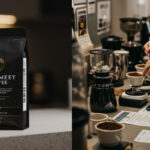
Introduction to Special and Common Coffee
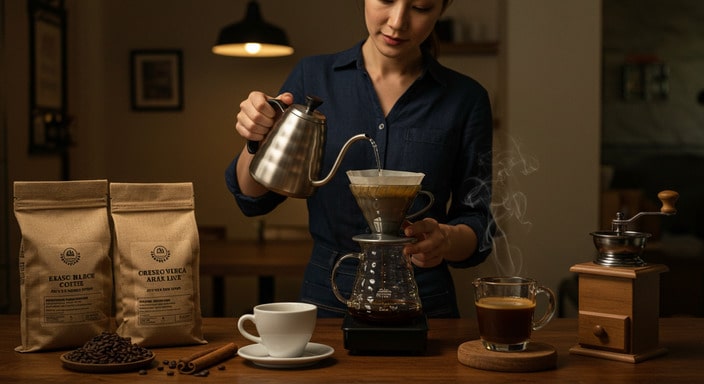
Table of Contents
ToggleWhat is Special Coffee?
Special coffee, often referred to as specialty coffee, is the pinnacle of quality in the coffee world. It is defined by its exceptional flavor profile, which is free from defects and inconsistencies. To be classified as specialty coffee, the beans must score 80 points or above on a 100-point scale as evaluated by certified coffee professionals. These beans are typically sourced from specific regions, often single-origin, and are grown under optimal conditions. The meticulous processing, roasting, and brewing techniques further enhance their unique characteristics, offering a refined and memorable coffee experience.
What is Common Coffee?
Common coffee, on the other hand, is what most people encounter in everyday settings. This category includes mass-produced coffee that is widely available in supermarkets, diners, and chain coffee shops. While it may be enjoyable and accessible, common coffee often falls short in terms of flavor complexity and quality. The beans are usually a blend of lower-grade varieties, and the focus is on quantity rather than craftsmanship. Common coffee is roasted en masse, often resulting in a more generic taste that lacks the nuance and depth found in specialty coffee.
Bean quality and sourcing
Specialty coffee bean types and regions
When it comes to specialty coffee, the type of bean and its origin play a pivotal role in shaping the flavor profile. Specialty coffee is primarily made from Arabica beans, known for their complex flavors, subtle acidity, and aromatic qualities. While Arabica dominates the specialty scene, some producers also use Robusta beans in blends or specific roasts to add a bold, earthy undertone and a robust caffeine kick.
Regions like Ethiopia, Colombia, Brazil, and Kenya are renowned for producing some of the finest Arabica beans. Each region imparts unique characteristics:
- Ethiopia: Often referred to as the birthplace of coffee, Ethiopian beans are celebrated for their floral, fruity, and wine-like notes.
- Colombia: Known for its balanced flavor profile, Colombian coffee offers bright acidity with hints of caramel and nuts.
- Brazil: Brazil’s beans are typically smooth and nutty, often with chocolatey undertones.
- Kenya: Kenyan coffee is prized for its vibrant acidity and berry-like sweetness.
Specialty coffee is also distinguished by its focus on single-origin beans, which means the coffee comes from a specific farm, region, or cooperative, allowing for traceability and a unique flavor story.
Common coffee bean characteristics
In contrast to specialty coffee, common coffee often relies on a mix of Arabica and Robusta beans, typically sourced from larger, less specialized farms. These beans are commodity-grade, meaning they are grown for mass production rather than exceptional quality. Here’s what sets them apart:
- Flavor profile: Common coffee tends to have a more generic taste, often with less complexity and a focus on consistency rather than nuance.
- Sourcing: These beans are usually blended from multiple regions, making it difficult to trace their origin or verify their cultivation practices.
- Processing: Mass-produced beans often undergo less meticulous processing methods, which can result in inconsistent flavor and aroma.
While common coffee is more accessible and affordable, it lacks the depth, character, and ethical transparency that specialty coffee enthusiasts cherish.
Farming and processing methods
Sustainable practices in specialty coffee
When it comes to specialty coffee, sustainability is not just a buzzword—it’s a way of life. Farmers who produce specialty coffee often prioritize environmentally friendly practices. This includes shade-grown coffee, which protects biodiversity by preserving natural habitats for birds and other wildlife. Many specialty coffee farms also use organic farming methods, avoiding synthetic pesticides and fertilizers in favor of natural alternatives.
Water conservation is another critical aspect. Specialty coffee producers often implement techniques like drip irrigation and rainwater harvesting to minimize water waste. Additionally, many farms focus on soil health by using composting and crop rotation, ensuring the land remains fertile for future generations.
- Shade-grown coffee preserves ecosystems.
- Organic farming avoids harmful chemicals.
- Water conservation techniques reduce waste.
- Soil health is maintained through sustainable practices.
Mass production techniques in common coffee
In contrast, common coffee is often grown on large-scale plantations where efficiency and high yields take precedence over sustainability. These farms typically rely on monoculture, growing only coffee plants, which depletes soil nutrients and increases the risk of pest outbreaks. To combat this, synthetic pesticides and fertilizers are heavily used, which can have long-term environmental impacts.
The processing methods for common coffee are also focused on speed and volume. The washed process, for example, uses large amounts of water to remove the coffee cherry’s outer layers, often leading to water pollution if not managed properly. Additionally, mechanical harvesting is common, which, while efficient, can be less selective and result in lower-quality beans.
- Monoculture depletes soil nutrients.
- Synthetic chemicals harm the environment.
- High water usage in processing leads to pollution.
- Mechanical harvesting affects bean quality.
Roasting techniques
Small-batch roasting for special coffee
Small-batch roasting is a hallmark of specialty coffee, where each roast is carefully monitored to bring out the unique characteristics of the beans. This method allows for precision and customization, ensuring that every batch meets the highest quality standards. Roasters pay close attention to factors like bean origin, moisture content, and desired flavor profile, often using artisanal techniques to achieve the perfect roast.
Key benefits of small-batch roasting include:
- Enhanced flavor development: Controlled roasting brings out the bean’s nuanced notes, from fruity to floral.
- Consistency: Smaller batches allow for meticulous quality control.
- Freshness: Beans are roasted in limited quantities to ensure peak flavor upon brewing.
Large-scale roasting for common coffee
In contrast, large-scale roasting focuses on efficiency and uniformity, catering to the mass market. This method is designed to produce consistent flavor profiles across vast quantities, often sacrificing the unique characteristics of individual beans. Large roasters typically use automated systems to handle the high volume, ensuring speed and cost-effectiveness.
Characteristics of large-scale roasting:
- Standardization: Aims for a uniform flavor to appeal to a broad audience.
- Affordability: Economies of scale make common coffee more accessible.
- Longer shelf life: Roasting techniques are optimized for extended storage and distribution.
“The difference between small-batch and large-scale roasting is like the difference between a handcrafted meal and a fast-food burger—one is tailored for taste, the other for convenience.”
Brewing and Flavor Profiles
Precision Brewing Methods for Special Coffee
When it comes to special coffee, precision is key. Brewing methods like pour-over, AeroPress, and siphon brewing are favored by coffee connoisseurs for their ability to highlight the unique characteristics of high-quality beans. These methods allow for meticulous control over variables such as water temperature, grind size, and brew time, ensuring that every cup is a reflection of the bean’s terroir and processing.
- Pour-over: Enhances clarity and brightness, ideal for single-origin coffees.
- AeroPress: Produces a rich, full-bodied cup with minimal bitterness.
- Siphon Brewing: Yields a clean, aromatic brew with a tea-like consistency.
Using a gooseneck kettle and a digital scale can elevate your brewing game, ensuring consistency and precision. Remember, special coffee demands attention to detail—every second and every gram counts.
Standardized Brewing for Common Coffee
Common coffee, often found in grocery stores or diners, is typically brewed using standardized methods like drip coffee makers or French presses. These methods prioritize convenience and consistency over nuance, making them accessible for everyday use. While they may not highlight the subtle flavors of premium beans, they still produce a satisfying cup for many coffee drinkers.
- Drip Coffee Makers: Quick and easy, perfect for large batches.
- French Press: Delivers a bold, robust flavor with minimal equipment.
- Espresso Machines: Creates a concentrated shot, often used in milk-based drinks.
For common coffee, the focus is on simplicity and speed. Pre-ground beans and automatic machines are often used, making it a practical choice for busy mornings.
“The difference between special and common coffee isn’t just in the beans—it’s in the care and craftsmanship of the brewing process.”
Certifications and Transparency
When it comes to specialty coffee, certifications aren’t just stamps on a bag—they are a guarantee of quality, ethics, and sustainability. They offer a level of transparency that allows you to trace your coffee’s journey from farm to cup, ensuring that every sip supports responsible practices.
Why Certifications Matter in Specialty Coffee
Certifications like Fair Trade, Organic, and Rainforest Alliance are more than marketing tools—they are commitments to a better coffee ecosystem. Here’s what they signify:
- Fair Trade: Ensures farmers receive fair compensation, empowering communities and promoting equitable trade.
- Organic: Guarantees the coffee is grown without synthetic pesticides or fertilizers, protecting both the environment and your health.
- Rainforest Alliance: Focuses on sustainable farming practices that conserve biodiversity and support worker welfare.
These certifications also provide a traceable chain of custody, allowing you to know exactly where your coffee comes from and how it was produced. This level of detail is a hallmark of specialty coffee, reflecting its dedication to quality and ethics.
The Lack of Traceability in Common Coffee
In contrast, common coffee often lacks this transparency. Many mass-produced coffees are blends sourced from multiple origins, making it nearly impossible to trace their roots. Without certifications or detailed labeling, you may never know:
- Where the beans were grown.
- Whether fair wages were paid to farmers.
- If environmentally harmful practices were used during cultivation.
This lack of information not only diminishes the coffee experience but also raises ethical and environmental concerns. Specialty coffee, with its emphasis on certifications and transparency, offers a clear alternative for those who care about what’s in their cup.
Why Invest in Special Coffee?
Specialty coffee is more than just a beverage—it’s an experience. Investing in premium coffee allows you to savor the nuances of flavor, aroma, and craftsmanship that set it apart from ordinary brews. Here’s why making the switch to special coffee is worth every sip.
Benefits of Premium Coffee Experiences
Unmatched Flavor: Specialty coffee is made from carefully selected, high-quality beans that are roasted to perfection. This attention to detail results in a cup of coffee that’s rich, complex, and bursting with unique flavor notes.
Ethical Sourcing: Many specialty coffee roasters prioritize sustainability and fair trade practices. By choosing premium coffee, you’re supporting farmers who are paid fairly for their hard work and dedication.
Healthier Choices: Specialty coffee often contains fewer impurities and chemicals compared to mass-produced coffee. You can enjoy your daily cup knowing it’s made from pure, unadulterated beans.
A Journey of Discovery: Exploring specialty coffee opens the door to a world of new tastes and brewing methods. Each cup becomes an adventure, allowing you to appreciate the artistry behind every sip.
How to Start Exploring Specialty Coffee
If you’re ready to dive into the world of special coffee, here are some simple steps to get started:
- Visit a Specialty Coffee Shop: Start by visiting a local café that focuses on premium coffee. Talk to the baristas and ask for recommendations based on your taste preferences.
- Experiment with Brewing Methods: Try different brewing techniques like pour-over, French press, or AeroPress. Each method brings out unique flavors in the coffee.
- Buy Freshly Roasted Beans: Look for roasters who provide roast dates on their packaging. Freshly roasted beans ensure the best flavor and aroma.
- Invest in Quality Equipment: A good grinder and coffee maker can make a world of difference. Start with essentials and upgrade as you refine your brewing skills.
- Join a Coffee Community: Connect with other coffee enthusiasts online or in person. Sharing experiences and tips can enhance your journey.
Specialty coffee is an investment in quality, sustainability, and your own enjoyment. It’s a way to elevate your coffee routine and discover the incredible diversity of flavors that coffee has to offer. So why settle for ordinary when you can experience extraordinary?
FAQ
Is specialty coffee more expensive?
Yes, specialty coffee often comes with a higher price tag due to the quality of beans, ethical sourcing, and artisanal roasting. However, the investment is well worth it for the exceptional taste and experience.
Can I brew specialty coffee at home?
Absolutely! With the right tools and a little practice, you can create café-quality coffee in your own kitchen. Start with freshly roasted beans and experiment with different brewing methods.
How do I know if I’m buying good specialty coffee?
Look for transparency in sourcing, roast dates, and flavor notes on the packaging. Reputable roasters will provide detailed information about their beans and processes.
is an editor at Coffee With Finance and a true coffee enthusiast. He explores roasts, flavors, origins, and brewing methods, sharing stories that captivate both beginners and experts. Petter believes great coffee sparks meaningful moments—and that includes simple, jargon-free talks about personal finance. His content blends aroma, flavor, and insight, making each coffee break an inspiring and enriching experience.


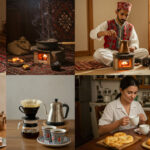










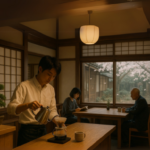




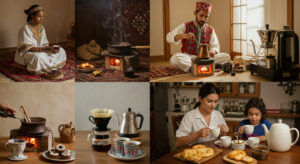









Post Comment